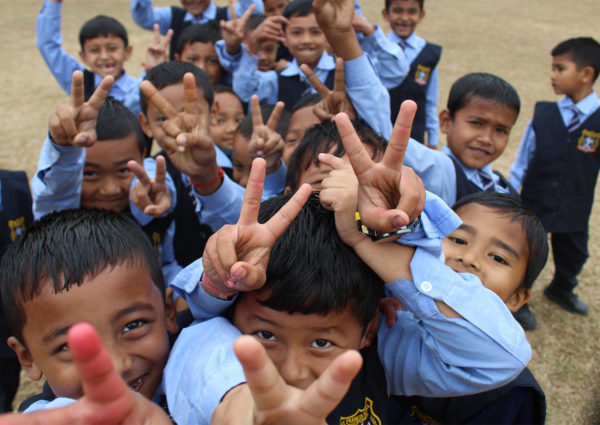Isidor Isaac Rabi won the Nobel Prize in Physics in 1944 for his discovery of nuclear magnetic resonance. Once, a journalist asked him how he became a scientist. His reply was interesting. Every day when he returned from school, his mother used to ask him, “Did you ask a good question today?” His mother was more interested in her son’s critical thinking than in what he learned from school or teachers. Her daily questioning inspired him to be critical rather than simply memorizing knowledge. “Asking good questions made me become a scientist,” said Isidor. A student who answers the teacher’s questions in a classroom is not great enough anymore. A good student must be capable of asking good questions to his/her teachers, parents, and to themselves.
The good news is that our country’s new Education Policy (NEP 2020) is against rote learning or memorization-based education. UNICEF strongly advocates improving skills in critical thinking, problem-solving, and self-reliance among students. A significant number of schools have been training their students to enhance their ‘Life Skills.’
Socrates, the father of ancient Greek Philosophy, championed a learning process among his disciples known as the ‘maieutic’ method. This method, named after the job of a midwife, involves a teacher engaging in dialogue with pupils, fostering interaction among them in the teaching-learning process. In a modern interpretation, we can liken the role of a teacher to that of a gynaecologist assisting a pregnant woman in giving birth. It’s essential to recognize that the teacher, like the gynaecologist, is not the creator but a facilitator in the process of delivering knowledge. However, not all teachers and parents view the role of a teacher as a facilitator. Some parents consider a good recipient to be synonymous with a great child. Additionally, some teachers still adhere to the belief that monologue is more effective than dialogue or interactive methods in teaching.
This article serves as an informal grassroots social analysis aiming to explore the implications of the goals set by UNICEF and the NEP 2020 concerning critical thinking among students in the rural settings of our vast country. Conducting a primary-level investigation involving a cross-section or sampling a rural area in Assam may provide insights into current trends in education.
Most parents in Assam are deeply invested in their children’s education; however, a concerning trend is the pervasive influence of the ‘culture’ of private tuition. Shockingly, a substantial number of parents spend significant resources, both financial and energy, on enrolling their children in private tuition centers. What’s particularly disturbing is that many parents send even their kindergarten and lower primary children to these tuition centers.
Reasons one or many?
- A significant number of parents believe that the hours their kids spend at school are not sufficient for effective learning.
- Parents often perceive a lack of satisfactory academic performance from their children.
- Some parents express concern that teachers at regular schools, despite being registered under the Department of Education and holding professional qualifications like B.Ed. or D.El.Ed., may not be capable of enhancing the quality of their child’s learning.
- Many parents face language barriers, particularly with English (and sometimes Hindi, Maths, and Science), making it difficult for them to assist with homework or clarify their children’s doubts.
- For working parents without extended family support, tuition centers serve as a form of day care before and after school hours.
- A small group of parents send their children to private tuition as a way to ‘feel good’ and fulfill their sense of duty in providing extra educational support.
- Some parents, influenced by societal pressure or current trends, opt to send their children to tuition centers.
Reality Check:
Approximately half of the students in a class lack motivation in a rural setting, posing a significant challenge for both parents and teachers. Inspiring them to develop a basic interest in academics proves to be a difficult task. Notably, students attending private schools outperform their counterparts in government schools in Assam.
Negative Impacts:
- Many countries discourage homework for children in KG, Grades 1, and 2 to ensure they have more quality time for play, crucial for their emotional and physical development. Finland, known for its high-standard education system and ranking top for the highest Happiness Index in 2023, exemplifies this approach with no homework for kids.
- Educationalists and psychologists emphasize that play is a powerful avenue for learning. Play therapy, used to address emotional and behavioral issues, highlights the importance of play in a child’s development. Depriving a child of playtime puts their behavior at risk.
- Excessive pressure from parents or compulsory attendance at tuition may lead to a child’s future disinterest in studies.
- Some students may put less effort into classroom learning, perceiving it as repeating the same syllabus covered in both school and tuition centers.
- A blame game is evident, with students, teachers, and parents pointing fingers at each other. This lack of a proactive approach hinders positive change in the situation.
Exceptions
Some parents and schools actively discourage high-intensity private tuitions, emphasizing the importance of fostering self-reliance (‘ATMANIRBHAR’), intelligence, and skills in critical thinking and problem-solving in their children. Recognizing that their child’s behavior, mental health, and approach towards life are more crucial than mere academics and grades (GPA), they prioritize holistic development. If you are a parent what is the choice you make – Critical thinking or rote learning?
Tailpiece
Imagine this humorous and imaginative scenario, I get a chance to ask God a question. Here are some of the questions asked.
Nikita Khrushchev asked God, “Do you think the US and the USSR will ever have peace?” God replied, “Yes, but not in your time.”
John F. Kennedy asked God, “Will there be peace between blacks and whites?” God responded, “Yes, but not in your time.”
Golda Meir questioned God, “Will there be peace between the Jews and the Arabs?” God answered, “Yes, but not in my lifetime.”
So, I ask you, what is your question?
Similar Posts
-
Rural India’s struggle with English medium school – Tony
I am a high school teacher and a MSW (Masters of Social Studies) student. I am not against English o
-
School my second home – Aditi Rao
Vidyaranya is my school, my second home: The place where I learned to study and to play, I learned h
-
What has changed? – Dikhita Basumatary
It’s crazy how when we were young. The more our weight was, the prouder we were, More sleepless hour
-
Lost Innocence – Sudha Nair
Up until a few years ago, I taught at a college. In one of my classes, I remember this moment of ang
-
Vacation or extended school? – Sudha Nair
ALL seasons have their own beauty and attractions but, summer is special in more ways than one. Summ











